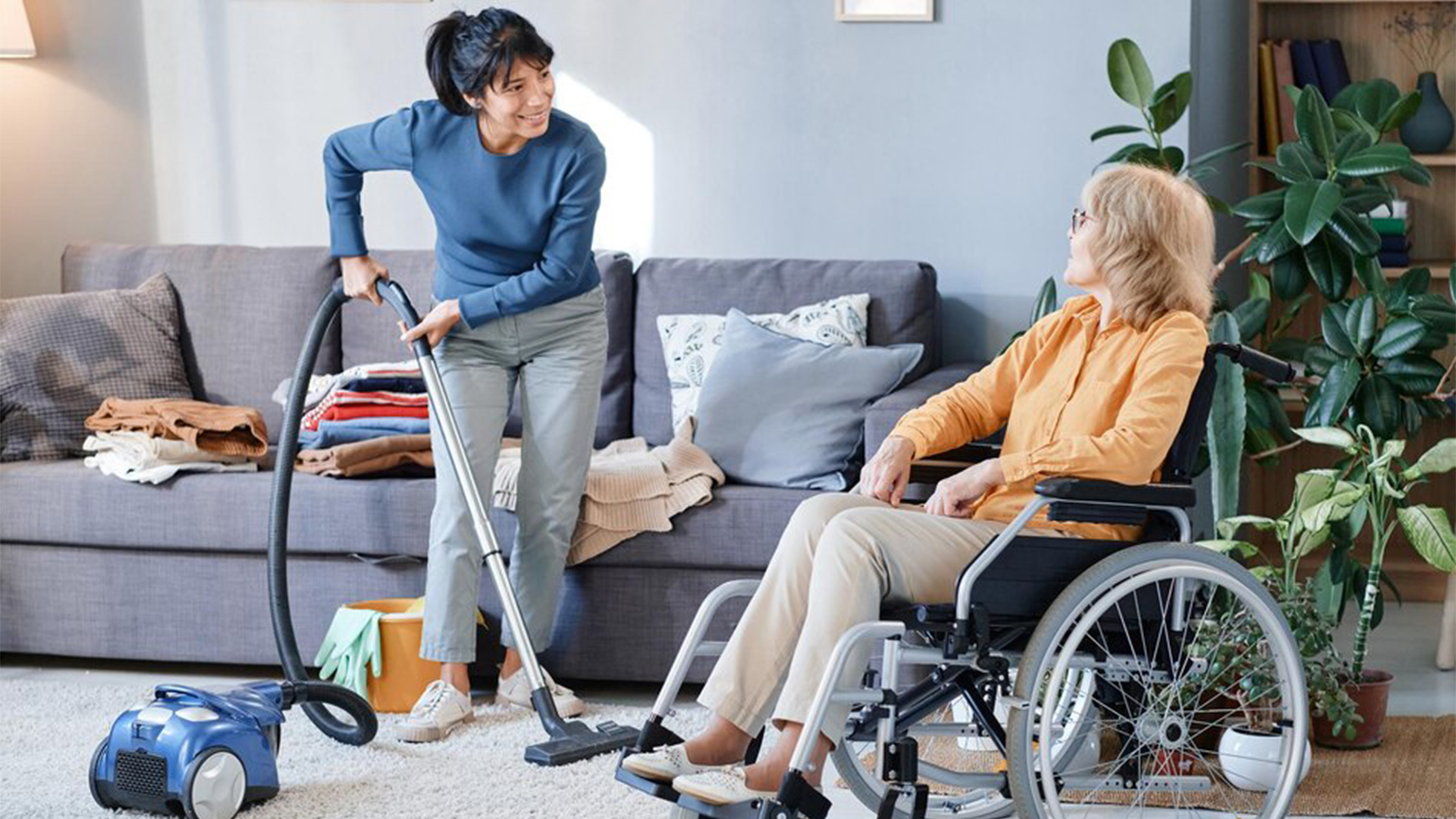Why Home Treatment Providers Are Vital for Comprehensive Impairment Services and Support
Home care suppliers play an important function in providing comprehensive disability solutions and support. They aid individuals with disabilities in day-to-day living jobs, cultivating self-reliance and boosting high quality of life. By creating tailored care strategies, these professionals resolve distinct demands, guaranteeing reliable interventions. Their effect expands beyond functional assistance. Comprehending the complete scope of their contributions discloses deeper ramifications for area inclusivity and support. What lies underneath this important solution?
Recognizing the Role of Home Care Providers
Although several may presume that home treatment providers mainly aid with basic daily tasks, their function incorporates a broader spectrum of support customized to people with disabilities. These professionals play a fundamental part in boosting the lifestyle for clients by offering support that extends beyond mere housekeeping or personal hygiene. Home care service providers commonly assist in social communication, aiding to deal with sensations of seclusion that can go along with special needs. They may likewise assist with medication management, ensuring that people abide by their suggested therapies successfully. Furthermore, home care service providers frequently aid in working with consultations and transport, advertising access to important medical treatment. By promoting independence and providing psychological assistance, they equip individuals to involve even more fully in their areas. This all natural technique not only addresses physical demands yet likewise nurtures emotional and psychological wellness, illustrating the complex nature of their considerable duty in handicap services.
Tailored Treatment Plans for Person Requirements
Tailored treatment plans are crucial for attending to the unique demands of individuals with handicaps, making sure that each client gets personalized assistance. Home care suppliers collaborate with customers, families, and medical care professionals to establish these comprehensive strategies. By assessing the details challenges and choices of each person, companies can recognize required solutions and treatments that align with their goals.These treatment strategies take into consideration different variables, including physical health and wellness, psychological well-being, and social interactions. They might incorporate help with day-to-day activities, restorative solutions, or customized equipment. The involvement of caretakers that understand the nuances of each customer's scenario enhances the effectiveness of these plans, promoting a more helpful atmosphere.

Enhancing Independence and High Quality of Life
Enhancing freedom and quality of life for individuals with handicaps requires a focus on advertising day-to-day autonomy. Personalized care options can encourage clients to choose that finest match their unique requirements and choices. ndis providers. By facilitating this freedom, home treatment providers play a vital duty in enhancing total health and complete satisfaction
Promoting Daily Autonomy
Empowering individuals with handicaps to accomplish everyday freedom significantly improves their lifestyle. Home treatment companies play a crucial role in this procedure by urging self-sufficiency and promoting self-reliance. By supporting tasks of day-to-day living, such as individual hygiene, meal prep work, and flexibility, caretakers assist clients construct self-confidence in their capacities. This support not just improves functional abilities yet also advertises analytical and decision-making capacities. Additionally, by respecting specific preferences and selections, home treatment providers cultivate an atmosphere where clients really feel valued and equipped. The result is a considerable boost in self-esteem and total health, permitting people with handicaps to navigate their every day lives with greater simplicity and satisfaction. Eventually, promoting everyday autonomy is vital for cultivating dignity and freedom.
Personalized Care Solutions
Individualized treatment solutions are essential in meeting the special needs of people with handicaps, straight affecting their self-reliance and lifestyle. These tailored approaches consider each person's preferences, capacities, and specific difficulties, guaranteeing that assistance is both reliable and appropriate. Home treatment suppliers analyze specific conditions, developing personalized strategies that address physical, emotional, and social demands. By promoting interaction and cooperation, caretakers encourage clients to actively take part in their very own care, advertising freedom. This not just boosts their self-worth yet additionally motivates involvement in day-to-day tasks. Eventually, personalized treatment remedies add to an extra satisfying and enriched life for people with impairments, enabling them to thrive within their areas and preserve self-respect in their day-to-day experiences.
Linking the Void Between Medical and Daily Treatment
Bridging the gap between medical and day-to-day treatment is essential for individuals with disabilities. A coordinated care technique can boost customized everyday support, making certain that customers get both clinical assistance and day-to-day help customized to their needs. This combination inevitably results in an enhanced high quality of life for those obtaining home care solutions.
Coordinated Treatment Strategy
A collaborated treatment technique is crucial for properly incorporating clinical solutions with daily living assistance for individuals with handicaps. This technique cultivates cooperation amongst health care families, caretakers, and professionals, making certain that all facets of an individual's treatment are synchronized. By facilitating interaction in between medical providers and home treatment personnel, the coordinated method decreases voids in solution shipment and improves the general quality of care. This synergy enables timely interventions, lowering medical facility readmissions and enhancing health outcomes. Additionally, it equips try these out people with handicaps by supplying an alternative support group that addresses both medical demands and day-to-day living obstacles. Ultimately, a collaborated treatment technique is important for promoting independence and find out this here improving the high quality of life for those with impairments.
Personalized Daily Aid
Efficient day-to-day support plays a necessary duty in attaching healthcare with the day-to-day needs of individuals with disabilities. Home treatment companies customize their services to meet the distinct requirements of each person, making certain that individual care, dish prep work, and home jobs are taken care of successfully (home care provider). This individualized strategy not only facilitates adherence to prescribed medical programs yet additionally encourages people to preserve a level of independence. Caretakers are educated to identify and attend to details challenges that clients face, bridging the void between scientific appointments and daily living. By incorporating medical knowledge with functional support, these carriers improve the general effectiveness of care, guaranteeing that people get all natural assistance that includes both their health and wellness and everyday living requirements
Boosted Top Quality of Life
While healthcare is important for people with impairments, it is the combination of day-to-day living support that absolutely boosts their lifestyle. Home care carriers connect the space in between clinical focus and daily demands, using tailored aid that promotes freedom. By dealing with individual treatment, house tasks, and social engagement, these providers produce a setting for wellness. This alternative method not only aids in physical health however also promotes emotional security and social connections. When individuals obtain personalized support, they experience increased confidence and improved psychological health, bring about greater life complete satisfaction. Ultimately, home care solutions encourage people with specials needs to lead meeting lives, making them a vital part of complete disability solutions and assistance.
The Importance of Educated Specialists

Structure Strong Relationships With Customers and Households
Establishing solid connections with Visit This Link clients and their households is necessary for improving the general top quality of home care solutions. Home care suppliers that prioritize communication and count on cultivate an atmosphere where customers feel secure and valued. This link allows caretakers to better comprehend private demands and preferences, bring about even more individualized care strategies.Moreover, including family participants in the care process helps ensure that everyone is straightened on objectives and assumptions. Routine updates and open discussions create a feeling of collaboration, which can alleviate issues and construct confidence in the care being provided.Confident customers and families are most likely to engage actively in the care plan, bring about enhanced wellness results. Furthermore, strong connections encourage comments, enabling companies to continually adjust and improve their solutions. Eventually, these bonds lay the structure for an encouraging, respectful, and reliable home care experience.
Promoting for Rights and Availability in the Neighborhood
Promoting for the rights and ease of access of people with impairments within the area is important for fostering a comprehensive environment. Home treatment carriers play a crucial duty in this advocacy by raising awareness of the obstacles dealt with by individuals with impairments. They team up with neighborhood companies, government companies, and stakeholders to promote policy modifications that boost access to services and public spaces.These carriers likewise empower clients by notifying them of their legal rights and available resources, motivating self-advocacy. This assistance not only improves individual lives yet also grows a culture of inclusivity in the community. By actively taking part in campaigning for initiatives, home care suppliers aid take apart stigma and discrimination, making certain that people with specials needs can take part totally in society.Ultimately, the dedication of home treatment companies to support for legal rights and access contributes substantially to the growth of a more helpful and equitable community for all.
Regularly Asked Concerns
What Certifications Should I Try to find in a Home Care Provider?
When examining a home treatment company, one should consider qualifications such as relevant accreditations, experience in particular care demands, solid communication skills, history checks, and favorable referrals to guarantee top quality and safety in caregiving.
Exactly How Do Home Treatment Services Differ From Conventional Nursing Treatment?
Home treatment solutions focus on personalized aid within clients' homes, fostering freedom, while typical nursing care typically includes medical treatments in medical setups. This distinction emphasizes personalized assistance versus institutionalized medical therapy for different demands.
What Is the Common Cost of Home Treatment Providers?

How Can I Find a Respectable Home Treatment Agency?
Discovering a credible home treatment company includes looking into regional choices, reading testimonials, examining qualifications, and seeking suggestions from health care specialists or friends. It's important to talk to potential agencies to guarantee they fulfill particular treatment demands.
What Insurances Usually Cover Home Care Services?
Insurance policy protection for home treatment services often includes Medicare, Medicaid, and personal medical insurance strategies. Each plan differs, so people need to consult their insurance copyright to comprehend certain advantages and protection information associated to home treatment solutions. Furthermore, home treatment providers regularly help in working with consultations and transport, advertising accessibility to essential medical care. By assisting in interaction in between clinical service providers and home care personnel, the collaborated approach minimizes voids in service delivery and improves the total quality of treatment. Home care companies customize their services to meet the special requirements of each person, ensuring that personal care, meal preparation, and house jobs are taken care of effectively. Home treatment services focus on individualized support within clients' homes, cultivating self-reliance, while typical nursing treatment usually involves medical treatments in scientific setups. The normal expense of home treatment services varies widely, depending on aspects such as location, degree of treatment needed, and duration of service.